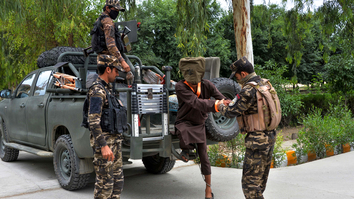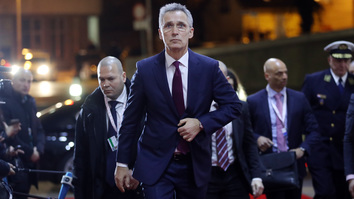KABUL -- Dismay pervaded across Afghanistan Tuesday (March 3) after the Taliban launched a number of co-ordinated attacks against Afghan forces just days after signing a deal with the United States, justifying its new campaign of violence on a false pretense of what the agreement entailed.
In Kandahar Province, considered the Taliban's heartland, fighting broke out in at least two districts.
"They started attacking five of our posts in Panjwai and Maiwand," local police chief Sultan Mohammad Hakimi told AFP. "Fighting is ongoing."
The Taliban ordered their fighters to recommence attacks against Afghan army and police forces, apparently ending an official "reduction in violence" that had seen a dramatic drop in bloodshed and given Afghans a welcome taste of relative calm.
![Members of the Taliban delegation gather ahead of the signing ceremony with the United States in Doha, Qatar, on February 29. [Giuseppe Cacace/AFP]](/cnmi_st/images/2020/03/03/22778-000_1pg1mx-585_329.jpg)
Members of the Taliban delegation gather ahead of the signing ceremony with the United States in Doha, Qatar, on February 29. [Giuseppe Cacace/AFP]
The partial truce among the United States, the insurgents and Afghan forces lasted for the week running up to the signing of the US-Taliban accord in Doha on February 29 and was extended over the weekend.
"The reduction in violence ... has ended now, and our operations will continue as normal," Taliban spokesman Zabiullah Mujahid told AFP.
"As per the [US-Taliban] agreement, our mujahideen will not attack foreign forces, but our operations will continue against the Kabul administration forces."
The Taliban's military commission circulated instructions for fighters to resume operations, according to a document that an insurgent provided to AFP.
Soon after, the Taliban were attacking military positions in Badghis Province, an Afghan army commander told AFP. At least one soldier was killed.
President Ashraf Ghani March 1 said he would continue the partial truce at least until talks between Afghan officials and the Taliban kick off, supposedly on March 10.
The Taliban have been expressing anger on social media at the Afghan government's refusal to release 5,000 Taliban prisoners as detailed in the US-Taliban agreement.
Despite the repeated insurgent claims, the wording of the agreement clearly states that the prisoner exchange was contingent on "coordination and approval of all relevant sides".
"The United States is committed to start immediately to work with all relevant sides on a plan to expeditiously release combat and political prisoners as a confidence building measure with the coordination and approval of all relevant sides," the agreement states.
Ghani, within his right as detailed in the agreement, on Sunday said he would not commit to this particular clause as a condition to hold intra-Afghan talks. He instead said the prisoner exchange should be discussed once negotiations begin.
Since then, the Taliban have been illegitimately justifying their escalating violence on this refusal.
Violating spirit of agreement
"If the announcement of resumption of violence by Taliban is verified, this is against the spirit of the agreement just signed in Doha. This is not the time for posturing, but the phase to build trust & move forward in a constructive manner," tweeted Roland Kobia, the European Union's special envoy for Afghanistan.
Under the terms of the deal, foreign forces will leave Afghanistan within 14 months, subject to Taliban security guarantees and to a pledge by the insurgents to hold talks with Kabul.
Analyst Michael Kugelman from the Wilson Centre, a think tank based in Washington, said he was not surprised the Taliban were on the offensive again.
"Remember, violence is leverage for the Taliban. It won't easily give it up," he tweeted.
"And now it's exploiting that leverage to strengthen its bargaining position going into the intra-Afghan dialogue, when (and if) it begins."
Cautious optimism
Afghan sharply criticised the Taliban for their resumption of attacks against Afghans.
"Afghans killing Afghans. Muslims killing Muslims. And the Taliban say this is 'jihad'?" Sultan Ghani said in a Twitter post.
While supporters of the accord say it marks a critical first step toward peace, many Afghans -- especially women -- fear it will ultimately see the insurgents return to power.
Millions of Afghans fled the country during the 1990s while it was in the throes of a brutal civil war and as the Taliban took control.
Khatera Safi's family were among those who sought refuge in neighbouring Iran.
"I am optimistic in the sense that lives will not be lost, [but] when it comes to the laws imposed by the Taliban and their strict ideology, I am very concerned," the 29-year-old human rights activist told AFP in Kabul.
The deal also has its opponents. Observers have pointed out that the Iranian regime may seek to be a spoiler by engaging proxy groups to strike at US and Afghan interests.
The "Islamic State of Iraq and Syria" (ISIS), which has been effectively defeated in Afghanistan, may also attempt to sow discord in an attempt to scuttle the deal.

![Taliban militants and villagers celebrate the peace deal in Alingar District, Laghman Province, March 2. [Noorullah Shirzada/AFP]](/cnmi_st/images/2020/03/03/22777-000_1pi96q-585_329.jpg)







Taliban did not violate the agreement, but America and its puppet government violated it. The agreement writes that 5000 Taliban prisoners would be released from the custody of the government of Afghanistan before March 10; however, Ashraf Ghani the president of Afghanistan has rejected this, and has said that he wouldn’t release Taliban's prisoners. Taliban are ready to release all the war prisoners of the Afghan government. Now see who violates the spirit of the agreement? Taliban or Afghan government? Afghan government violates it.
Reply1 Comment